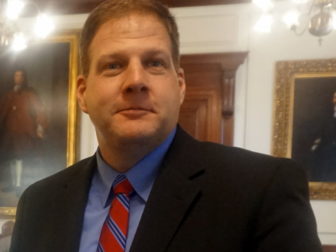By GARRY RAYNO, InDepthNH.org
The House and Senate have been at odds over taxes this session and jousting continues into the final weeks.
The House approved lowering the interest and dividends tax, while reducing the research and development credit for businesses to pay for it.
The Senate has always been fond of the R&D credit since it was established in an economic revitalization package approved in the early 1990s.

Garry Rayno
The House added the reduction into a bill passed earlier this month. This week the Senate will likely approve phasing out the interest and dividends tax over five years — beginning with the next biennium — while retaining the research and development credit at its current $7 million annual cap.
This little dust up over several bills will be resolved in a conference committee of House and Senate negotiators.
Homebuyer break
Similarly the Senate wants to give first-time homebuyers a break on the state’s real estate transfer tax which both buyers and sellers pay and one of the best money makers for the state over the last five or six years.
The House Ways and Means Committee did not like the change saying it would be unconstitutional treating new homeowners differently than current home owners.
The Senate is expected to add the provision as an amendment to House Bill 1252, a bill concerning tax stamps when deeds are filled with the counties.
Earlier this session the House politely killed a bill establishing the workplace recovery tax credit for businesses participating in the Recovery Friendly Workplace Initiative program, and some were concerned the same fate might befall Senate Bill 564, which establishes the regenerative manufacturing business tax credit, touted by inventor Dean Kamen and others to help establish a new industry in New Hampshire to mass produce human organs.
Under the bill, the 10-year exemption from state business taxes is tied to a $5 workforce development program under the Business Finance Authority.
The House Ways and Means Committee is recommending the bill on a 22-1 vote, a far different outcome than feared when it first arrived at the committee after sailing through the Senate.

Rep. Bill Ohm
“The committee analysis is that most of the qualified business entities will not show a profit for several years. However, in the waning years of this program, revenues may be substantial and a windfall to New Hampshire may occur after the 10-year window expires,” said committee member Bill Ohm, R-Nashua. “If the program is a failure, NH only loses BET tax revenue as no profits were generated. In any event, the business activity associated with the program will be very beneficial to Manchester and much of the surrounding areas, and indeed much of the state if large tracts of land are needed for suppliers.”
The House votes on the bill Thursday.
Uncompensated Care
Last week we looked at a proposal to include more health-care providers under the Medicaid Enhancement Tax to help offset what is projected to be a $30 million to $35 million shortfall in what the state owes hospitals for uncompensated care or services the hospitals provided, but not paid for or less than they cost under the state Medicaid reimbursement rates.
A recent federal court decision said the federal government failed to follow requirements to change the formula to determine a hospital’s uncompensated care.
The government failed to properly post the change and allow for a comment period.
Under the old formula which remains in place, New Hampshire hospitals would receive over $70 million more in uncompensated care. The state and federal government share program costs.
The Senate has another way of addressing the issue and hospitals counting on the extra money would never see it.

Sen. Chuck Morse
At 1:15 p.m. Tuesday, the Senate Finance Committee holds a public hearing on a proposed amendment from Senate President Chuck Morse, R-Salem, to allow the Department of Health and Human Services to escrow the state’s share of the money until all appeals are exhausted.
The bill allows HHS to appropriate up to $38 million more for the program from money not otherwise appropriated. The state has the money with its $52.2 million revenue surplus three-quarters of the way through the fiscal 2018 budget.
If the state had paid the hospitals and the federal government eventually wins the case, the hospitals would have to repay the money.
But this way the hospitals never see the extra money, the state can keep it and earn interest on it as well.
The amendment would be attached to House Bill 1102 allowing the state to hire two certified addiction and recovery doctors to review medication assisted treatment.
With the Senate President’s name on it, the amendment is likely to sail through the Senate.
Marsy’s Law
Another bill that sailed through the Senate with the backing of Gov. Chris Sununu is hitting a stone wall in the House.
Members of the House Criminal Justice and Public Safety and Judiciary committees voted 24-11 to kill CACR 22, which establishes the rights of crime victims equal to those of the perpetrator.
A majority of House members could vote for the bill, but fail to attain the needed 60 percent support to be placed on the 2018 general election ballot.

Rep. Paul Berch
The bill “would jeopardize the juvenile justice system’s focus on rehabilitation, and it would tilt the justice system in favor of the government by applying to class B misdemeanors for which defendants do not even have a right to counsel,” according the Judiciary Committee member Paul Berch, D-Westmoreland. “It would create impossible conflicts for prosecutors who could be asked to represent both the interests of the state and the interests of private parties. It would make the state financially responsible for unpaid restitution, be it for regular people, corporations, or insurance companies.”
But supporters say it would help level the playing field for victims who are often not informed of proceedings or deposition of cases involving the perpetrator.
Bill supporters said the bill needed to be changed and an amendment was proposed to make the needed changes but failed to pass the committees.
“This amendment reflects a basic recognition that when a crime is perpetrated, the victim’s life is significantly altered,” said Criminal Justice and Public Safety Committee member Shannon Chandley, D-Amherst. “The goal of this amendment is not to tilt the scales of justice in favor of the victim; it is to secure for victims basic, fundamental rights within the criminal justice system.”
A close vote is likely Thursday.
Death Penalty
For years House members have passed bills repealing the death penalty only to have the Senate vote to kill the bill or in recent years deadlock 12-12, which also kills it.
This session the Senate approved Senate Bill 593 which replaces the death penalty with life without parole.
The House Criminal Justice Committee voted 12-6 to recommend the House pass the bill, but Sununu has said he will veto it.

Gov. Chris Sununu
The House on Thursday is likely to pass the bill, but not by enough votes to override a veto. The Senate vote lacked the two-thirds majority needed for an override as well.
So Sununu will be the first governor since Jeanne Shaheen 20 years ago to veto a bill repealing the state’s death penalty.
Going Down
A number of controversial bills that passed the House are excepted to be killed outright or quietly on Thursday.
Chief among them the family and medical leave bill that made its way through the House over the past two sessions.
The Senate Finance Committee voted 4-2 down party lines to recommend House Bill 628 be sent to interim study, a polite death in the second year of the two-year term as the next legislature has no obligation to do anything with the bill.
House Bill 1415 would provide an $100,000 death benefit to a teacher or other public school staff killed while performing his or her job.
The Senate Finance Committee voted 4-2 down party lies to kill the bill, as did members on House Bill 1756, which would have given State Retirement System retirees a cost of living raise, the first in more than a decade.
Also recommended for the slag heap is House Bill 1786 which would have prevented public officials from charging someone to view public documents under the right-to-know law. The Public and Municipal Affairs Committee voted 4-1 to recommend the bill be killed after it had passed the House.
Garry Rayno may be reached at garry.rayno@yahoo.com
Distant Dome by veteran journalist Garry Rayno explores a broader perspective on the State House and state happenings. Over his three-decade career, Rayno covered the NH State House for the New Hampshire Union Leader and Foster’s Daily Democrat. During his career, his coverage spanned the news spectrum, from local planning, school and select boards, to national issues such as electric industry deregulation and Presidential primaries. Rayno lives with his wife Carolyn in New London.
With the 2018 session of the General Court winding down, the House and Senate shift into overdrive strategizing to ensure their position prevails before they go home to face their constituents.
